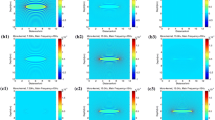Abstract
The CT/FSI (Canonical Transform/Full-Spectrum Inversion) technique permits achieving a high accuracy and vertical resolution in the retrieval of bending angle from radio occultation data. This technique can be universally applied for the (hypothetical) spherically-symmetric atmosphere and any multipath situation can be unfolded. The reason is that the CT/FSI technique uses a Fourier Integral Operator that maps the measured wave field into the impact parameter representation, and for a spherically-symmetric medium each ray has a unique impact parameter. For the real atmosphere with horizontal gradients the situation is different. Horizontal gradients result in the variation of the impact parameter along a ray. In the presence of strong horizontal gradients, a bending angle profile can become a multi-valued function. In this case, the CT/FSI technique in its standard variant will fail to correctly retrieve the bending angle profile. It is, however, possible to estimate bending angle errors. For this purpose we apply the sliding spectral analysis of the CT-transformed wave field. The spectral width is used as a measure of the bending angle errors. We perform numerical simulations with global fields from re-analyses of the European Centre for Medium-Range Weather Forecasts and show that this radio holographic technique can be effectively used for error estimation in the areas of multi-valued bending angle profiles.
Similar content being viewed by others
References
Gorbunov ME (2002) Canonical transform method for processing radio occultation data in lower troposphere. Radio Sci 37(5), doi:10.1029/2000RS002592
Gorbunov ME, Lauritsen KB (2004) Analysis of wave fields by Fourier Integral Operators and its application for radio occultations. Radio Sci 39(4), doi:10.1029/2003RS002971
Gorbunov ME, Lauritsen KB, Rhodin A, Tomassini M, Kornblueh L (2005) Analysis of the CHAMP experimental data on radio-occultation sounding of the earth’s atmosphere. Izv Atmos Ocean Phys 41(6):726–740
Gorbunov ME, Lauritsen KB, Rhodin A, Tomassini M, Kornblueh L (2006) Radio holographic filtering, error estimation, and quality control of radio occultation data. J Geophys Res 111(D10105), doi:10.1029/2005JD006427
Igarashi K, Pavelyev A, Hocke K, Pavelyev D, Kucherjavenkov IA, Matyugov S, Zakharov A, Yakovlev O (2000) Radio holographic principle for observing natural processes in the atmosphere and retrieving meteorological parameters from radio occultation data. Earth Planets Space 52(11):893–899
Jensen AS, Lohmann MS, Benzon HH, Nielsen AS (2003) Full spectrum inversion of radio occultation signals. Radio Sci 38, doi:10.1029/2002RS002763
Jensen AS, Lohmann MS, Nielsen AS, Benzon HH (2004) Geometrical optics phase matching of radio occultation signals. Radio Sci 39(3), doi:10.1029/2003RS002899
Kravtsov YA, Orlov YI (1990) Geometrical Optics of Inhomogeneous Media. Springer-Verlag, Berlin, Heidelberg, New York
Lohmann MS (2006) Dynamic error estimation for radio occultation bending angles retrieved by the full spectrum inversion technique. Radio Sci 41(RS5005), doi:10.1029/2005RS003396
Sokolovskiy SV, Rocken C, Lenschow DH, Kuo YH, Anthes RA, Schreiner WS, Hunt DC (2007) Observing the moist troposphere with radio occultation signals from COSMIC. Geophys Res Lett 34(L18802), doi:10.1029/2007GL030458
Author information
Authors and Affiliations
Corresponding author
Editor information
Editors and Affiliations
Rights and permissions
Copyright information
© 2009 Springer-Verlag Berlin Heidelberg
About this chapter
Cite this chapter
Gorbunov, M., Lauritsen, K. (2009). Error Estimate of Bending Angles in the Presence of Strong Horizontal Gradients. In: Steiner, A., Pirscher, B., Foelsche, U., Kirchengast, G. (eds) New Horizons in Occultation Research. Springer, Berlin, Heidelberg. https://doi.org/10.1007/978-3-642-00321-9_2
Download citation
DOI: https://doi.org/10.1007/978-3-642-00321-9_2
Published:
Publisher Name: Springer, Berlin, Heidelberg
Print ISBN: 978-3-642-00320-2
Online ISBN: 978-3-642-00321-9
eBook Packages: Earth and Environmental ScienceEarth and Environmental Science (R0)




